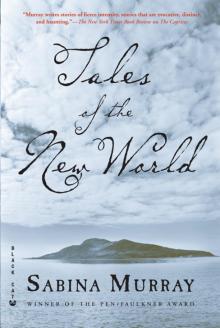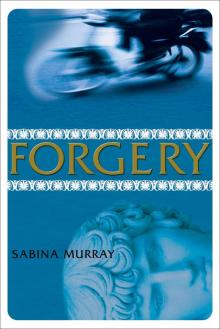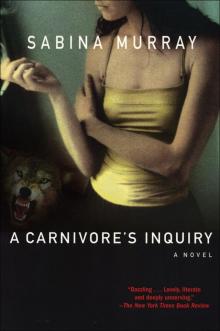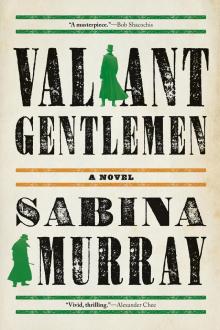- Home
- Sabina Murray
A Carnivore's Inquiry Page 3
A Carnivore's Inquiry Read online
Page 3
“You want me to leave.”
“I,” said Pietro, “want you to be happy, not small happy,” he gestured around the room—the cot, the sink in the corner, the overflowing ashtray—“but big happy.”
“Like you and your wife?”
“Yes.”
I can’t say that Boris made me feel “big happy,” but I did feel safe. I had terrible nightmares—blood and bone dreams, where faces torn out of the walls were coming at me—but Boris’s snoring always woke me up before I had to see my nightmare through to its conclusion. I slept less than I ever had, maybe four hours a night. My mother had the same sleeping habits, a result of her illness. When she’d married my father she was still all right—he said normal, although I doubted that—but once she got sick, her sleeping patterns became erratic. I remember her, in the time before the pills, always being awake. If I got up in the middle of the night to use the bathroom I’d see the light on in the living room and hear the television—sitcom laughter, muffled narration” or she’d be reading. Maybe now my mother was willing me to have the education that I’d somehow failed at or that had somehow failed me. Boris had a lot of books and I sat in the living room waiting for the sun to rise, reading and reading. Bleak House. The Gulag Archipelago. Birth of the Modern.
I had never been a good student, although I’d shown enough intelligence to frustrate my teachers. In literature, my papers lacked focus and I had a bad habit of referring to characters—what on earth does Anna Sergeyevna see in Gurov?—as if they were my acquaintances. In art history I was determined to pursue the course of study with no attention to dates, although a complex chronological scheme was clear to me. In history, I remembered anecdotes and family trees with surprising precision; in class I often found myself telling stories of this monarch’s sexual dalliances and the odd, three-toed offspring that somehow resulted. The sciences all seemed to be scheduled in the early morning. Philosophy was populated by abstract, sincere, unattractive boys and equally unattractive, aggressive girls. I displayed great enthusiasm for the visual arts, equaled only by an absence of talent. I tried drama. People said I had a flair for the dramatic and I thought I could bring my G.P.A. up to the 2.0 necessary to continue, but I hated all the other students. I spent entire class periods in the costume room brushing the wigs affectionately. I failed and failed and failed. Packed up my things, tried elsewhere, helped a boyfriend sell coke at parties, and was asked to leave.
After all this, I still tried to nurture the fantasy that college had been wonderful for me, that I’d been part of a super group of girls, but when I tried to remember them, my imagination replaced the Bryn and Erica and Jasmine, who I had actually known, with a group of giggling, cigarette-pants-wearing coeds, who all looked like Sandra Dee. I really had no friends to speak of and I’m sure it was my fault.
My mother always told me that friends were overrated. I had never known her to have one, other than me, and despite the fact that she had a befuddled mind (diagnosed) and a slew of drugs in her blood (prescribed) I still trusted her. In fact, my mother was the only person I trusted and after a year in Italy, although I’d been safe from her illness and her slow retreat from life, I missed her. But now, back in the States, I found myself unwilling to see her. She was still in the hospital, unless some miracle of well-being had happened in my absence. In a way I liked that. I could find her. I would go and see her soon. As soon as I figured out how to get to her without involving Boris, as soon as I could make peace with seeing my father or, more likely, find a way to my mother that did not involve going through him. I hadn’t really made a success of my time in Italy and although I personally felt that success was overrated, my father did not. I was his one failed investment and I bothered him.
Italy had ostensibly been a chance for me to pursue my interest in art. I was one of those people who made up for what she lacked in talent with her father’s money. And my father liked the idea of my studying art in Italy far more than my working at a local restaurant while trying to get credit at South Shore Community College. So he anted up. And I took off after the first humiliating day of life drawing, spent sketching a nude Florentine named Davido, who I managed to master in other ways.
I tried to call my mother a couple of times, struggling with pounds of gittoni at public phones, but had never been able to get through. The first time, the nurse had tried to put my father on, and I’d hung up. Another time the nurse didn’t know who my mother was and when she was trying to figure out where she’d been moved, my stack of phone tokens ran out. Things like that will wear you down, make a country lose its charm. Also, being American was a full-time occupation, exhausting and false. America was named for an Italian, so shouldn’t there have been some sort of easy sisterhood between the two countries? There was not. I wondered how Vespucci would have felt if he knew that his name would be attached not only to the wondrous new continent, but also to hamburgers, blue jeans, rock-and-roll, and loud men who videotaped themselves while walking backward up the steps of the Uffizi. I constantly found myself playing Jean Seberg to a host of unlikely Jean-Paul Belmondos and this had made me want to go home. But here, with Boris, wasn’t I doing the same thing?
“Boris,” I asked, “do you like Faulkner?”
“Liking is irrelevant,” he said. “I know Faulkner.”
Sometimes he thought he was Faulkner.
I had good days and I had bad days. Sometimes my headaches knocked me out for hours. Sometimes they kept me up. I wandered around the apartment, spent hours looking at his shelves and all his collectibles—the first editions and the special bookcase by the stereo that he reserved for the hundreds of opera librettos that, he told me, comprised the most extensive private libretto collection in the Americas. All this pacing ought to have made me stir-crazy, but I still felt under the weather. Boris—to undercut my concern—bought me some fancy iron supplements that came with an eyedropper.
He said, “Take it with orange juice.” Boris was occupied with his new writing project, a novel called The Little Vagrant. It was best for him to assume I was in good health and so that’s how it was. He actually found my pallor appealing.
He told me, “In the old days, women drank arsenic to look like that.” Then he disappeared back into his study. He was there from about eight in the morning until four in the afternoon. I made him sandwiches and brought them in, but he didn’t want to talk. He usually yelled at me, “Leave it. Leave it.” But if I didn’t bring him lunch, he’d ask me if I was trying to starve him. At night, he read.
At the time, I had a weird affection for Boris, for everything about him. Even the way he looked. The hair on his chest and shoulders was soft and gray, like cobwebs. His teeth were yellowed and crossed in the front. When he smiled, his mouth pulled downward, which made him look in pain, bothered by the possibility of happiness. The top of his head was completely bald, but the hair that stretched around it—the foothill vegetation—sprouted wildly. There were shallow, polished lines on his forehead, but his face still looked fresh and pink, like a baby’s. He had soft, pudgy hands with short fingers. He gestured with these hands, stretching them into the space between us with splayed fingers, as if he were presenting me with two starfish. With these hands, he reached out to me. With these hands, he fended me off.
With a fifty-dollar bill in his hand, he was almost handsome.
We were content and amicable, although after the first month I became aware of discord—an abstracted, patient discord—that was hovering around the apartment just as the ghost of Boris’s old pipe-smoking habit lurked in the rugs. To make myself useful, I had started organizing his libretto collection but soon found myself being drawn into their pages. Quick melodrama. Almost instant gratification. Boris was on the cold side, but I didn’t take this personally. Boris was not even warm with himself. Joy was not elusive, it was irrelevant. Boris considered himself an Epicurean, but anything past base sensual stimulation—a good cheese, Callas singing “La Wally”—was beyond his capacity for e
njoyment. He did not know how to enjoy himself. He had learned what was enjoyable by studying others and took pride in this, since it was intellectual. One Thursday night he took me to the opera—Madame Butterfly—which was a great three-hour opportunity for him to meditate on the discomfort of his seat. He thought he might have hemorrhoids. While the soprano was still in the “di” of “Un bel di” he turned to me and said, “She’s weak in the high register.”
People peered over their opera glasses at him and he scowled back. He ruffled noisily through his score, although he couldn’t read music.
“Shut up, Boris,” I whispered. I rested my head against the scratchy wool of his jacket and fell asleep. I didn’t know how else to deal with him when he was aggravated. I didn’t want to make a scene. I couldn’t imagine anyone being able to sustain a relationship with Boris, then I realized that I was doing just that and it surprised me.
Boris had been involved with a woman a short time before. Ann. An artist. For fifteen years. I was seven years old when they got together. One afternoon when I’d run out for cigarettes, I returned to find Boris and Ann sitting together at the dining room table. Boris must have been in the middle of explaining our relationship because my entry caused a deep silence. At first I thought she was just a friend. But she was looking at me as a man would look at me. Her eyes kept moving to gauge the length of my legs, or just stopped on my face, even though Boris was speaking. She was looking through a man’s eyes, Boris’s eyes, to see what he saw in me. And I think all she was coming up with was “young-young-young,” with an occasional “thin” thrown in just to make the situation intolerable. I say this because she seemed to wilt in the few minutes we sat there as if having consumed an aging potion that caused her cheeks to sag and her eyes to sink. I saw a Night Stalker rerun like that.
“Is Ann a good friend of yours?” I asked.
“Ann is my oldest friend,” he replied. “You have to make peace with her.”
“Oh. I have to make peace with her. I don’t know if you noticed this, but Ann’s the one who has a problem, not me.”
“I will not involve myself in such pettiness,” he said.
“But you are involved in it Boris. She’s your ex.”
“This jealousy is ugly,” said Boris.
“Jealousy?”
Boris took my chin in his hand and walked me in this manner over to the mirror. “Not becoming,” he said. “It mars your features.”
Sometimes I thought I’d like to mar Boris’s, with an ax.
Ann stopped by about once a week to check up on Boris. One day, a Wednesday, she stopped by and Boris wasn’t there. He had a meeting— lawyers, editors, I don’t know—so I invited her in for coffee.
Ann walked around the living room as if she were a real estate agent. She looked out the window, then at the built-in shelves, as if she’d never been in the apartment before. Ann was attractive in a stocky, Swedish peasant sort of way. She had intelligent gray eyes and thick lips and nostrils. She was dressed in a bolt of earth-toned fabric that was pinned on the shoulder by a large bronze fist. Her hands were stained vibrant primary hues and I remembered how Boris referred to her work as “Ann’s finger painting.”
“Ann,” I said, “how do you like your coffee?”
“Black,” she said. She smiled in a dismissive way. “Katherine, what do you do?”
“Day to day?” I set down Ann’s mug on the table and sat catty corner to her. “I’m organizing Boris’s librettos. There’s a lot to read here. I just read Moby-Dick.”
“I’m glad to hear you’re not illiterate.”
“Well, I have read Moby-Dick.”
Ann smiled coldly. “Not a complete moron.”
“Although very young.”
Ann set down her mug. “I’m making you uncomfortable. And I’m making myself look like a fool.” She stood up. “Thanks for the coffee.”
“Ann,” I looked at her beseechingly, “don’t go. I’d like you to stay and finish your coffee, at least.”
Ann stopped to look at me.
“I mean it. I have no one to talk to except Boris. And you know Boris. I just sit there ... and I brewed that pot fresh, just for you.”
Ann was momentarily stunned. “What are you doing here,” she indicated the ceiling, “with Boris?”
I contemplated this. “Boris and I have a symbiotic relationship.”
“You’re using him.”
“He’s using me.”
Ann regarded me thoughtfully. “Couldn’t you find someone more your speed to float you?”
“I suppose I could. I don’t know.” I spun the mug in my hands. “I like Boris.”
“Why?”
“Do you know Boris’s story about the masturbating orangutan?”
“No.”
“Then you wouldn’t understand,” I said. “Why do you come back to Boris?”
“This is it for me, honey,” she said, although neither of us believed it. Ann looked deeply into her coffee as if it held the answers. She was almost pretty like this, quiet, gentle. Her immense gray eyes looked vulpine and northerly, as if I should see snowdrifts reflected in them.
“I think you’re just a phase of Boris’s,” she said. “When you dump him or become too difficult, this will all be a dream, the thing that Boris and I fight about.”
“Ann,” I said, “I don’t understand you at all.”
I heard a clatter on the stairs followed by a dull thumping on the door. I knew this meant that Boris’s hands were full and that he was knocking with his head.
“You’ll stay for dinner?” I said.
“What are we having?”
“I don’t know. There’s an eggplant in the refrigerator. Will you stay?”
“Sure,” said Ann. “I suppose you want me to cook. Unless you have something you do with eggplant?”
I shook my head, not as threatened as I should have been, then went for the door.
Outside in the hallway, Boris was embracing a large package wrapped in brown paper.
“What have you got there?” I asked.
“It’s a portrait.” Boris caught Ann’s back disappearing into the kitchen. “So what’s Ann doing here?”
“Ann,” I said, stepping back from the door, “is cooking us dinner.”
“That’s very sporting of her.”
“Yes, it is,” I said.
He gave me a look, not pleased but curious, then walked over to the dining room table to set his package on the table.
“Katherine, you will love this,” he said and began to tear at the crinkled brown paper.
Boris had been wandering around Little Italy in search of a reasonably priced can of extra-virgin olive oil when he was struck by a picture hanging in the window of Agnellino’s Catholic Supply. According to Boris, it was a picture of me. Boris did not hesitate. He went inside and bought the print, framed, for thirty dollars.
“Where’s the olive oil?” I asked.
“I couldn’t carry them both,” he said.
We looked at his Madonna, which was lying in the center of the dining room table in its crumpled sheath of paper, like a rosette radish on a lettuce leaf.
“It sort of looks like me,” I said.
“It’s a perfect likeness.” Boris looked around the walls deep in concentration. He set his hands into his field of vision with the thumbs tugged down into right angles. “No,” he said. He turned to another wall. “No,” he said again, and then he framed the living room wall that set the kitchen off from the rest of the apartment. There was already a painting hanging there, a self-portrait of Ann. Boris held the picture with its cheery gilt plastic frame. He set the print into the space in front of him.
“Yes,” he said.
Boris removed Ann’s painting and set it on the floor. He hung the Madonna with great care. He stepped back to look at the print, straightened it, and then poured himself a glass of wine. Ann had wandered out from the kitchen and was standing in the doorway running her hand through her
hair. She contemplated her self-portrait.
“Symbolism?” she said, gesturing to her picture.
“I don’t resort to such bald statements,” said Boris.
Ann stood back to study the print. “Is this new religious fervor?” she asked. She squinted over at Boris. “I remember you telling me that the only good thing about the Communists is that they torched all the Christians.”
Boris didn’t hear. “It’s Katherine,” he said. “Striking resemblance, don’t you think?” He turned to me. “Madonna della Katerina, as if the artist saw her and painted her.”
“Unlikely. This painting is Renaissance.” Ann looked at some small print beneath the picture. “Perugino, and it’s not even a Madonna. It’s a Magdalena.”
“What’s a Magdalena?” asked Boris.
“Mary Magdalene,” said Ann.
“The prostitute?”
“The saint,” I said. Ann and Boris looked at me, their faces impassive. “She dried Christ’s feet with her hair,” I added.
“Why were they wet?” said Ann.
“Why were what wet?” asked Boris.
I said nothing.
“I like it hanging there,” said Boris. “It adds a touch of humor to the apartment.”
Ann was a good cook. There was only the eggplant in the house, but somehow she managed to make it suffice—with pasta—for all three of us. I’d set the table with candles, which threw long shadows up on the white walls of the apartment. I made shadow puppets with my hands, a vague rabbit, something that looked like a rottweiler, or maybe a crocodile. Ann and Boris were talking about her new manager. Her manager, as far as I could tell, was someone who managed to sell Ann’s paintings to people who didn’t want them.
“Sang froid: Arctic Landscape that I did last spring? He sold it to someone as ‘Autumn Sunset.’ He said they could put it in their dining room. He sold it because the dimensions were perfect for above the sideboard.”
“Didn’t that have a skull floating in the foreground?” asked Boris, half-interested.
“A skeletal hand. If you don’t look that close, it’s not noticeable. I have some white light on the water in another part of the painting . . .”

 Tales of the New World: Stories
Tales of the New World: Stories Forgery
Forgery The Caprices
The Caprices A Carnivore's Inquiry
A Carnivore's Inquiry Valiant Gentlemen
Valiant Gentlemen